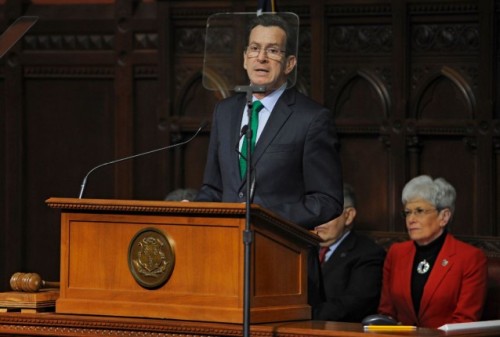
CREDIT: AP
By Alan Pyke, Think Progress
As federal officials attempt to thread the needle between restricting predatory lending and ensuring that emergency loans remain available to America’s poorest, they’re trying to create a new and adaptable system of rules. But in one state, the traditional approach to payday lending is producing a strange public relations fight between lawmakers, a governor, Native American tribes, and a mysterious D.C.-based conservative PAC.
Months after Connecticut regulators imposed a large fine on an unlicensed internet lender, a series of billboards showed up near the state’s highways accusing Gov. Dannel Malloy (D) of attacking the economic future of American Indians. The campaign made a big splash in a state that has two Indian-run casinos, and reportedly even featured a billboard in New York City’s Times Square. But nobody’s sure who is really paying for the billboards, and both Connecticut’s own tribes and the Otoe-Missouria insist they are not involved.
Connecticut is one of 15 states that uses a low interest rate cap to effectively ban payday lending. But an online lender affiliated with the Oklahoma-based tribe found a way into the Nutmeg State anyway.
The fines were announced in January, but the billboards have put them in the news again. The signs are just one piece of an inflammatory campaign against Malloy backed by a D.C.-area conservative nonprofit with anonymous donors. Billboards, direct mail ads, and online communications paid for by the Institute for Liberty (IFL) accuse Malloy of destroying the economic future of native peoples. The group publicly accused Malloy of “bigotry against Native Americans” and operates a website replete with vaguely-captioned stock photos of people in stereotypically tribal garb. A journalist named Johnnie Jae who managed to contact the individuals in the stock photos told ThinkProgress that “the regalia is authentic, [but] the main issue is that these families had no idea these images were being used for this campaign and were appalled.”
IFL President Andrew Langer told ThinkProgress the group has been following payday lending regulations “for a good 18 months now” and said their focus is on the sovereignty of the tribes involved in cases like the Connecticut one. “We think this tribe has a right to engage in this business, and we think the state of Connecticut has no legal authority to go after them,” Langer said.
When the legal theory around tribally-affiliated lending evaporated in a Connecticut courtroom earlier this year, it set off a strange firestorm in the state that might end up further tightening Connecticut’s laws on the loans.
State Rep. Matt Lesser (D) is sponsoring a bill he hopes will sharpen the state regulations that made the $1.5 million fine possible. Current law limits the penalties for violating Connecticut’s interest rate laws to the amount by which the customer was overcharged. “We’re taking it a step further and saying that any loan that exceeds the cap, the Department of Banking can declare it unenforceable, null-and-void,” Lesser told ThinkProgress. “We’re hoping it creates that extra incentive for these payday loansharks to respect our laws and stay out of our state.”
Because IFL is a 501(c)4 nonprofit, it does not have to disclose who is financing its attacks on Malloy. “I will neither confirm nor deny that we’ve received money from tribal industries or payday lending companies,” he said, “but I will say that if they are supporting us I wish they’d support us more.”
“They deny that it’s the Koch brothers, for whatever that’s worth,” Lesser said. “You can sort of look at who benefits and draw your own conclusion.” The two national trade associations who have the most direct interest – the Native American Financial Services Association (NAFSA) and the Online Lending Assocation (OLA) – each emphatically denied involvement to ThinkProgress, with NAFSA’s spokesperson adding that the IFL campaign has “done more harm than good” to the Otoe-Missouria’s cause.
Enforcing rate caps like Connecticut’s can be important to protecting consumers, Pew Charitable Trusts small-dollar lending expert Alex Horowitz told ThinkProgress, but they’re not the only option. “Rate caps are important and states should continue to set them. If they don’t want payday lenders to operate in the state, they should set them at 36 percent or less,” he said. But a more flexible sliding rate cap system like the one in Colorado has kept credit available in emergencies and pushed average interest rates on the loans down to 115 percent – extremely expensive, but about a third of what unregulated states routinely see.
The fallout from Connecticut’s decision is coming just as federal regulators are in the process of writing the first-ever national code for payday lending, auto-title lending, and other forms of expensive small-dollar credit.
The fines are “kind of a traditional tactic,” Horowitz said, “but they’re doing it very aggressively.” Applying that classical enforcement approach gets a bit slippery when the lender is attached to a tribe. The Connecticut dispute, Horowitz said, “underscores why the CFPB’s rules are so important. While there’s been some uncertainty in the courts about how to handle state-tribe disputes, it’s clear that a federal rule from the Consumer Financial Protection Bureau trumps the other ones and would set a floor on rules for all of these.”
With its new regulations, the agency seeks to balance genuine consumer demand for emergency loans with the public interest in preventing the most predatory and abusive features of the traditional business model. While many states have taken Connecticut’s approach of preventing payday lenders from operating in any form, a handful of others have attempted the kind of hybrid system that CFPB is now aiming to build into federal law. The final rules are years away, but they will likely be modeled on the approach that states like Colorado take: limit the cost of these loans, prohibit the most egregious fine-print tricks lenders use, but make sure this lending remains economically viable so that desperate low-income people have somewhere to turn.
The idea that tightly-regulated payday loan shops can be a genuinely valuable service for the poor may need a lot more time to sink in in places like Connecticut that have decided a ban would be better.
“When you talk to folks [about] how they wound up paying these back,” Lesser said, “it’s often by doing the things they probably should’ve done in the first place. Turn to family and friends and existing resources to make up that difference.”
“Poverty stinks. It’s tough. But eventually people are going to have to reckon with the cycle of poverty and debt these guys are foisting on them.”


